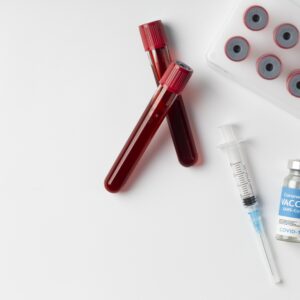A Blood Pregnancy Test is a laboratory test used to detect the hormone human chorionic gonadotropin (hCG) in the blood. This test is more accurate and sensitive than a urine pregnancy test and can confirm pregnancy as early as 10 days after conception.
Types of Blood Pregnancy Tests
-
Qualitative hCG Test
- Detects whether hCG is present in the blood.
- Provides a simple yes or no result for pregnancy.
-
Quantitative hCG Test (Beta hCG Test)
- Measures the exact level of hCG in the blood.
- Helps assess gestational age, monitor early pregnancy health, or detect ectopic pregnancy and miscarriages.
Why is a Blood Pregnancy Test Done?
- To confirm pregnancy earlier than a urine test.
- To diagnose complications like ectopic pregnancy or miscarriage.
- To monitor high-risk pregnancies.
- To check for multiple pregnancies (twins or triplets).
- To evaluate hCG levels in cases of suspected molar pregnancy or certain cancers (e.g., trophoblastic tumors).
Test Procedure and Preparation
- A blood sample is drawn from a vein in the arm.
- No fasting is required.
- Results are typically available within a few hours to a day.
Interpreting the Results
- Positive hCG: Confirms pregnancy.
- Rising hCG Levels: Suggest a healthy, progressing pregnancy.
- Declining hCG Levels: May indicate a miscarriage or ectopic pregnancy.
- High hCG Levels: Could indicate multiple pregnancies or a molar pregnancy.
Benefits of a Blood Pregnancy Test
- Early detection of pregnancy.
- Accurate monitoring of pregnancy progress.
- Quick diagnosis of pregnancy-related complications.
Blood pregnancy tests provide precise and reliable information, essential for early pregnancy care and medical decision-making.
 Blood Pregnancy Test
Blood Pregnancy Test Blood Pregnancy Test
Blood Pregnancy Test